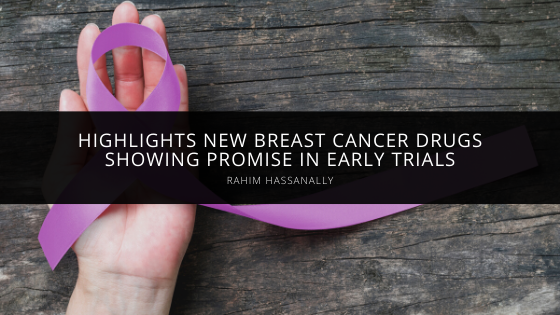Cancer awareness advocate and entrepreneur Rahim Hassanally shines a spotlight on two new drugs showing promise in early breast cancer trials.
Those diagnosed with advanced HER2-positive breast cancer may soon have new treatment options available to them following news that two experimental drugs have performed well in clinical testing. An advocate for cancer awareness, California-based entrepreneur Rahim Hassanally considers the results of these trials and what this may mean for those living with HER2-positive breast cancer.
Of those diagnosed with breast cancer, as many as 20 percent will specifically exhibit cells positive for HER2—or human epidermal growth factor receptor 2, which promotes the growth of cancer cells—according to Hassanally, an entrepreneur and cancer awareness advocate originally from Texas and now based in California. “This means that as many as one-fifth of those diagnosed with the disease can potentially be treated with HER2 protein-targeting drugs,” he explains.
News, then, of two new HER2 protein-targeting cancer drugs is excellent, Hassanally says, and will bring renewed hope, particularly to those who have experienced resistance to existing treatments for HER2-positive breast cancer, such as the drug marketed as Herceptin. “In combination with chemotherapy, around 80 percent of individuals treated with HER2-positive drugs live for a decade or more, with the majority of those showing no signs of their existing cancer after ten years,” explains Rahim.
For the remaining 20 percent, however, news of studies into novel therapies trastuzumab deruxtecan and tucatinib showing promise in early trials provides a new light at the end of the tunnel. “The news was presented earlier this month,” Hassanally reveals, “at the San Antonio Breast Cancer Symposium.”
While trastuzumab deruxtecan is an example of a so-called antibody-drug-conjugate treatment, tucatinib directly targets HER2-positive cells. “In this instance, trastuzumab deruxtecan prevents DNA replication and aims to stop cancer cells from effectively diving,” says Hassanally, “while tucatinib directly targets HER2-positive cells in advanced breast cancer patients, including those where the disease has spread, specifically to the brain.”
Both drugs, according to Rahim Hassanally, show great promise in the fight against breast cancer. “In light of new cancer drugs such as trastuzumab deruxtecan and tucatinib showing promise, it’s as important as ever,” he adds, wrapping up, “that we continue to invest in revolutionary cancer research if we’re to beat the disease once and for all.”
Based in Fairfield, California, Rahim Hassanally is a graduate of Southern Methodist University, a private Methodist research university in University Park, Texas. Born and raised in Texas before relocating to the so-called Golden State to pursue his entrepreneurial endeavors, Hassanally is a keen advocate for cancer awareness, particularly surrounding the importance of breast cancer screening and early detection. To learn more about Rahim Hassanally, head to https://rahimhassanally.co/.


